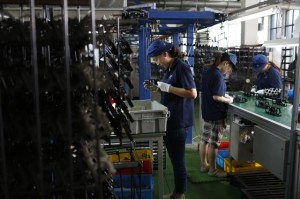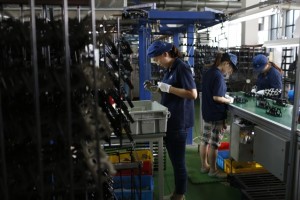Japanese Industrial production revived in September
In September, the Japanese industrial production revived sharply from a month earlier. However, growth was not enough to overshadow the second consecutive quarter of decline. The figures for the period from July to September will affect the gross domestic product for the period, Prime Minister Shinzo Abe will take into account when deciding whether to […]

 In September, the Japanese industrial production revived sharply from a month earlier. However, growth was not enough to overshadow the second consecutive quarter of decline. The figures for the period from July to September will affect the gross domestic product for the period, Prime Minister Shinzo Abe will take into account when deciding whether to increase the sales tax again next year. Industrial production grew 2.7% in September compared to one of 1.9% in August, according to the latest data from the Ministry of Economy, Trade and Industry of Japan. The increase is greater than the estimated respondents from Wall Street Journal and Nikkei analysts who had expected growth of 2.2%.
In September, the Japanese industrial production revived sharply from a month earlier. However, growth was not enough to overshadow the second consecutive quarter of decline. The figures for the period from July to September will affect the gross domestic product for the period, Prime Minister Shinzo Abe will take into account when deciding whether to increase the sales tax again next year. Industrial production grew 2.7% in September compared to one of 1.9% in August, according to the latest data from the Ministry of Economy, Trade and Industry of Japan. The increase is greater than the estimated respondents from Wall Street Journal and Nikkei analysts who had expected growth of 2.2%.
During the period from July to September production decreased by 1.9% on a quarterly basis. This happens after the car manufacturers and household appliances reduced stocks because of high inflation and weak demand after rise in sales tax from 1st April. For comparison – in the second quarter, the index fell by 3.8%.
According to a survey conducted by the Ministry of Economy, Trade and Industry in Japan business in October industrial production will shrink by 0.1% on a monthly basis in order to accelerate to 1% in November. The poor quarterly data suggest weak GDP growth in the third quarter after the collapse of 7.1% yoy in the second. Economists expect growth of 3.7% during the period, the weaker industrial production to be offset by growth in consumption and public spending. The GDP data for the third quarter will be published on 17th November. The information will be relevant for the decision of Shinzo Abe as to whether to increase once the sales tax embedded in the program for fiscal reforms. The GDP figures may also influence the course of monetary policy the Bank of Japan, aimed at increasing inflation. On the other hand, high inflation adversely affect private consumption.









